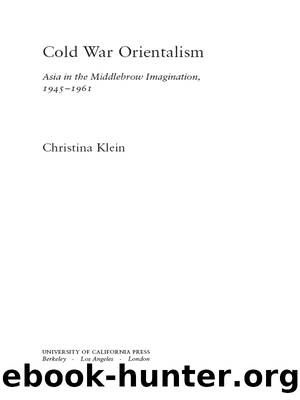Cold War Orientalism by Klein Christina

Author:Klein, Christina
Language: eng
Format: epub
Publisher: University of California Press
Figure 13. Christian Children's Fund advertisements appealed to Americans to “adopt” Asian children. (Courtesy Christian Children's Fund)
Figure 14. “This Picture is as DANGEROUS as it is PITIFUL!”: advertisement for Christian Children's Fund. (Courtesy Christian Children's Fund)
In one sense, the advertisements figure participation in terms of consumption: for $10 a month, the reader can purchase a child, protection from communism, and relief from a sense of political powerlessness. John C. Caldwell captured this sense of adoption as commodity consumption in his 1957 book on the CCF, Children of Calamity, when he described the cables CCF headquarters in Virginia regularly sent to the Hong Kong office. They sound like nothing so much as department store back orders: “Need 4,000 more children!” “Rush me 500 orphans,” “Need 200 Koreans, 10 Japanese mixed-blood, 50 Chinese, 10 Arabs.” The advertisements make purchasing a political act, and purchasing the idea of the family becomes a mechanism for creating ties between the U.S. and Asia.15
The “adoption” process also opened a route to participation in terms of education, in ways that echoed the contemporary discourse of travel. In checking the box marked “YES! I want to do what I can,” the reader expressed a willingness to learn more about the countries in which the children resided. The exchange of information played an important role in the “adoptive” relation. American “parents” and their “adoptees” exchanged personal narratives, letters, and photographs, thereby fostering a personal bond of intimacy that incorporated the Asian child, emotionally and textually, into the American family. This new family thus became a two-way site of education: the parents learned about the misery that communism bred, and the child learned about the material abundance and personal generosity that the capitalist “free world” offered. Like so many other forms of middlebrow culture, these “adoptive” families generated an interest in and knowledge about Asia that Washington deemed necessary for the success of its foreign policy. The CCF also linked its program to tourism more directly. CCF newsletters printed many reports of “parents” who had traveled to the far reaches of Asia and elsewhere to visit their “children,” and had seen firsthand how the people they were helping lived. CCF adoptions provided an impetus for Americans to go beyond an imaginary tour of Asia and, like Cousins's ideal tourist, embark on their own fact-finding expeditions.
Finally, “adopting” a child enabled a sense of participation in U.S. foreign policy. At the most abstract level, one can see the donation of funds as a confirmation of support for the enormous financial costs of the containment/integration foreign policy agenda. The CCF's appeal to feed starving children meshed with the logic of American food aid to Asia. When India faced widespread famine in 1950, advocates of aid urged Washington to send shipments of wheat, arguing that it offered not only a way to communicate America's concern for the people of Asia (particularly important at a time when the U.S. was being criticized for killing Asians in Korea), but also an opportunity to depict the United States as motivated by positive ideals other than anticommunism.
Download
This site does not store any files on its server. We only index and link to content provided by other sites. Please contact the content providers to delete copyright contents if any and email us, we'll remove relevant links or contents immediately.
| Anthropology | Archaeology |
| Philosophy | Politics & Government |
| Social Sciences | Sociology |
| Women's Studies |
The Secret History by Donna Tartt(18232)
The Social Justice Warrior Handbook by Lisa De Pasquale(11963)
Thirteen Reasons Why by Jay Asher(8472)
This Is How You Lose Her by Junot Diaz(6463)
Weapons of Math Destruction by Cathy O'Neil(5854)
Zero to One by Peter Thiel(5507)
Beartown by Fredrik Backman(5372)
The Myth of the Strong Leader by Archie Brown(5250)
The Fire Next Time by James Baldwin(5033)
How Democracies Die by Steven Levitsky & Daniel Ziblatt(4972)
Promise Me, Dad by Joe Biden(4916)
Stone's Rules by Roger Stone(4875)
100 Deadly Skills by Clint Emerson(4700)
A Higher Loyalty: Truth, Lies, and Leadership by James Comey(4567)
Rise and Kill First by Ronen Bergman(4554)
Secrecy World by Jake Bernstein(4407)
The David Icke Guide to the Global Conspiracy (and how to end it) by David Icke(4397)
The Farm by Tom Rob Smith(4332)
The Doomsday Machine by Daniel Ellsberg(4253)
